In a nutshell
Parashat Ki Tissa, Exodus 30:11–34:35, “when you take,” tells of building the Tabernacle, a portable holy sanctuary where the people can bring offerings to G-d. Priests were to wear special garments and wash before officiating in this sanctuary. Each person, rich and poor, was to donate half shekel to finance the service in the sanctuary, the incident of the Golden calf, the request of Mosheh for G-d to reveal G-d’s attributes, and how Mosheh became radiant. The Parashah is the longest of the weekly Torah portions in the book of Exodus (although not the longest in the Torah, which is Naso).
Machatzit haShekel
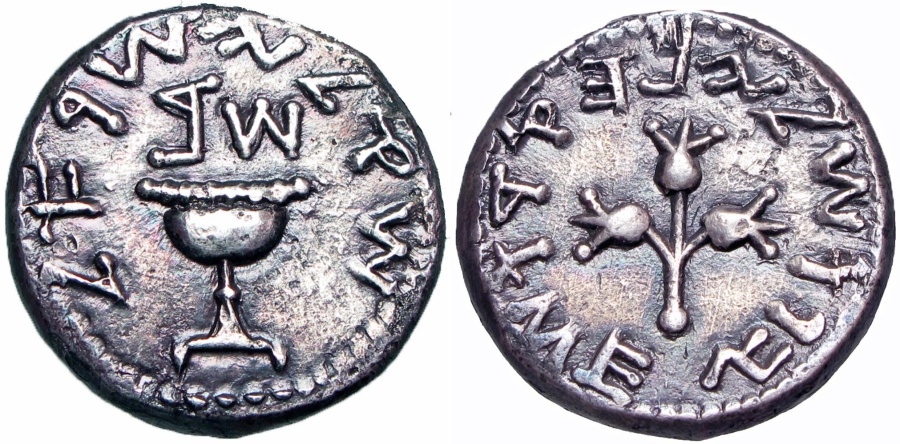
It all begins with the mitzvah of the half-shekel that was given by all adult Israelite (at least 20 years old), to pay for their daily korbanot. Everyone, poor or rich must give the same amount, but why the same amount? In addition, during Beit Hamikdash, all the mitzvot were expected to be performed in the most complete manner. Why is this mitzvah involve an incomplete , half shekel? The answer is that the rich man’s half shekel and poor man’s half shekel combined adds up to one shekel. The rich man and the poor man are considered equal in the eye of G-d. Machatzit haShekel reminds us that we need to unite, in order for us to be whole and complete. (Likutei Sichot vol. 31 p.132)
Veshamru

And Mosheh stays with G-d on Mount Sinai for 40 days and 40 nights. “Tell the children of Israel to keep My Sabbaths so that you may know that I am the Lord who sanctifies you. For those who profane My Sabbath, their soul shall be cut off from among the people. וְשָׁמְר֥וּ בְנֵֽי־יִשְׂרָאֵ֖ל אֶת־הַשַּׁבָּ֑ת לַעֲשׂ֧וֹת אֶת־הַשַּׁבָּ֛ת לְדֹרֹתָ֖ם בְּרִ֥ית עוֹלָֽם׃ The Israelite people shall keep the sabbath, observing the sabbath throughout the ages as a covenant for all time: בֵּינִ֗י וּבֵין֙ בְּנֵ֣י יִשְׂרָאֵ֔ל א֥וֹת הִ֖וא לְעֹלָ֑ם כִּי־שֵׁ֣שֶׁת יָמִ֗ים עָשָׂ֤ה יְהוָה֙ אֶת־הַשָּׁמַ֣יִם וְאֶת־הָאָ֔רֶץ וּבַיּוֹם֙ הַשְּׁבִיעִ֔י שָׁבַ֖ת וַיִּנָּפַֽשׁ׃ (ס) it shall be a sign for all time between Me and the people of Israel. For in six days the LORD made heaven and earth, and on the seventh day He ceased from work and was refreshed- Exodus 31:16-17. Then G-d gave Mosheh the 10 Commandments written with the finger of G-d on stone tablets.
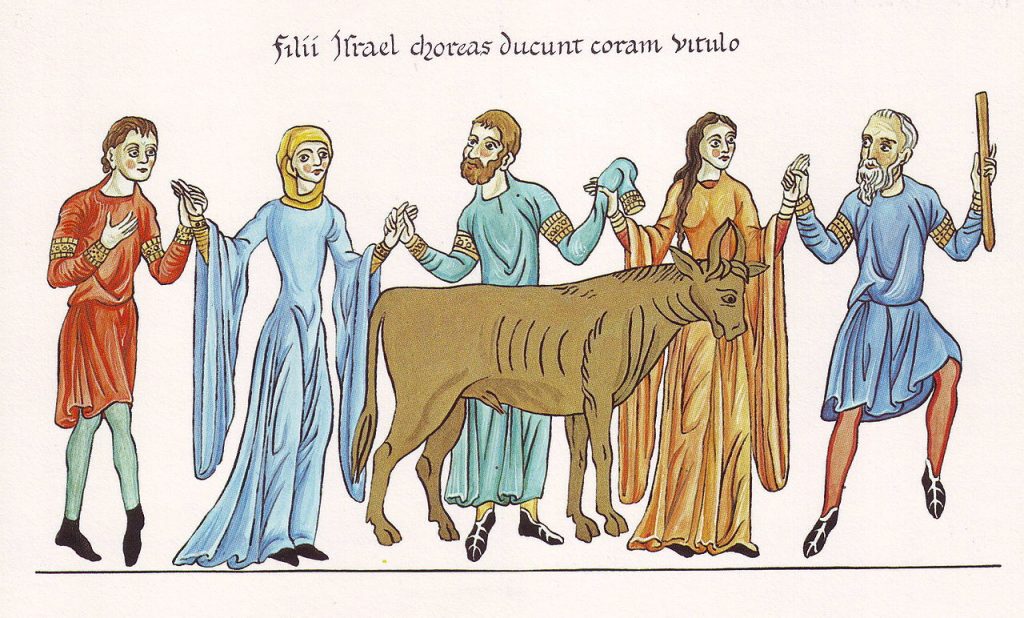
The Golden Calf
וַיַּ֣רְא הָעָ֔ם כִּֽי־בֹשֵׁ֥שׁ מֹשֶׁ֖ה לָרֶ֣דֶת מִן־הָהָ֑ר וַיִּקָּהֵ֨ל הָעָ֜ם עַֽל־אַהֲרֹ֗ן וַיֹּאמְר֤וּ אֵלָיו֙ ק֣וּם ׀ עֲשֵׂה־לָ֣נוּ אֱלֹהִ֗ים אֲשֶׁ֤ר יֵֽלְכוּ֙ לְפָנֵ֔ינוּ כִּי־זֶ֣ה ׀ מֹשֶׁ֣ה הָאִ֗ישׁ אֲשֶׁ֤ר הֶֽעֱלָ֙נוּ֙ מֵאֶ֣רֶץ מִצְרַ֔יִם לֹ֥א יָדַ֖עְנוּ מֶה־הָ֥יָה לֽוֹ׃ When the people saw that Mosheh was so long in coming down from the mountain, the people gathered against Ahron and said to him, “Come, make us a god who shall go before us, for that man Mosheh, who brought us from the land of Egypt-we do not know what has happened to him.” “Remove your gold earrings and bring them to me,” Ahron asked everyone to bring him their gold, so he can make a golden calf and they will worship it.
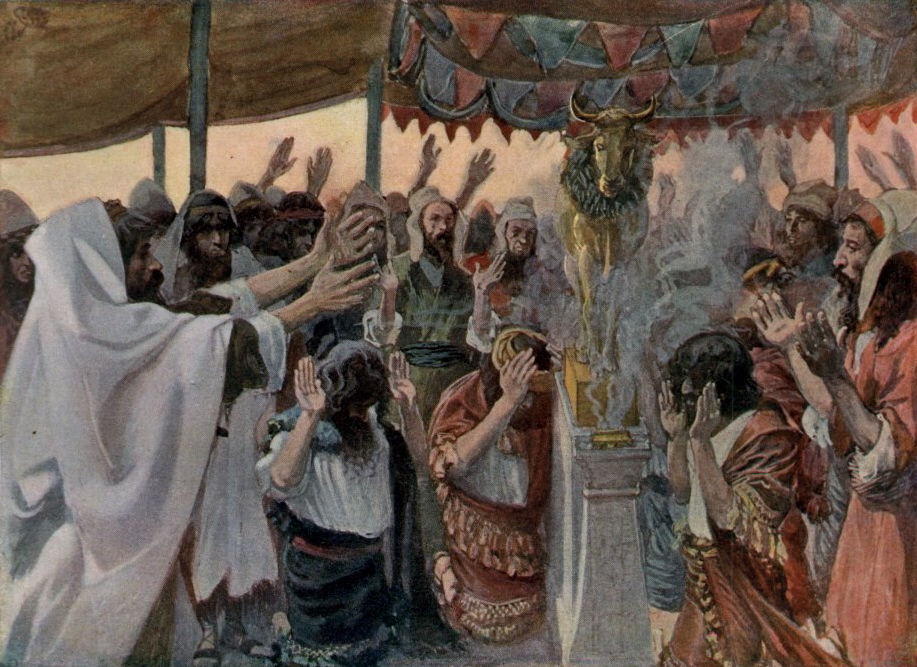
Back on Mount Sinai
G-d said to Moheh, “Go, descend, for the people brought from the land of Egypt have become corrupt. They strayed quickly. They made a molten calf and worshiped it as if it were Me. Now let Me alone so My anger may destroy them. ”But Mosheh pleaded with G-d on their behalf, and G-d forgives them. “Why destroy the people whom You saved?
לָמָּה֩ יֹאמְר֨וּ מִצְרַ֜יִם לֵאמֹ֗ר בְּרָעָ֤ה הֽוֹצִיאָם֙ לַהֲרֹ֤ג אֹתָם֙ בֶּֽהָרִ֔ים וּ֨לְכַלֹּתָ֔ם מֵעַ֖ל פְּנֵ֣י הָֽאֲדָמָ֑ה שׁ֚וּב מֵחֲר֣וֹן אַפֶּ֔ךָ וְהִנָּחֵ֥ם עַל־הָרָעָ֖ה לְעַמֶּֽךָ׃ Let not the Egyptians say, ‘It was with evil intent that He delivered them, only to kill them off in the mountains and annihilate them from the face of the earth.’ Turn from Your blazing anger, and renounce the plan to punish Your people-Exodus 32:12.
זְכֹ֡ר לְאַבְרָהָם֩ לְיִצְחָ֨ק וּלְיִשְׂרָאֵ֜ל עֲבָדֶ֗יךָ אֲשֶׁ֨ר נִשְׁבַּ֣עְתָּ לָהֶם֮ בָּךְ֒ וַתְּדַבֵּ֣ר אֲלֵהֶ֔ם אַרְבֶּה֙ אֶֽת־זַרְעֲכֶ֔ם כְּכוֹכְבֵ֖י הַשָּׁמָ֑יִם וְכָל־הָאָ֨רֶץ הַזֹּ֜את אֲשֶׁ֣ר אָמַ֗רְתִּי אֶתֵּן֙ לְזַרְעֲכֶ֔ם וְנָחֲל֖וּ לְעֹלָֽם׃
Remember Your servants, Abraham, Isaac, and Israel, how You swore to them by Your Self and said to them: I will make your offspring as numerous as the stars of heaven, and I will give to your offspring this whole land of which I spoke, to possess forever -Exodus 32:13
וַיִּנָּ֖חֶם יְהוָ֑ה עַל־הָ֣רָעָ֔ה אֲשֶׁ֥ר דִּבֶּ֖ר לַעֲשׂ֥וֹת לְעַמּֽוֹ׃ And the LORD renounced the punishment He had planned to bring upon His people- Exodus 32:14
The Broken Tablets
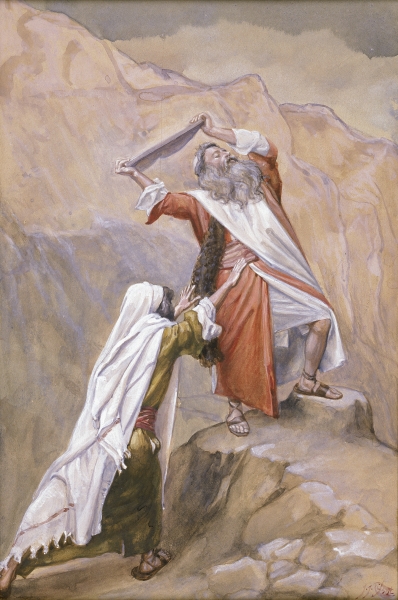
When Mosheh comes down the mountain, carrying the tablets engraved with the Ten Commandments; and sees the people dancing around this idol, he smashes the tablets on the ground, and destroys the golden calf. Mosheh stood outside the camp gate and said, “Whoever is for the Lord, come here!” Inside the camp some three thousand people were then killed. The next day, Mosheh said to the people, “You have sinned a great sin. Now I will go to G-d and try to make atonement. ”G-d punishes with a plague all the Israelites who were involved. Mosheh builds a tent to be his meeting place with G-d.
“Now go, Mosheh, and take the people to the land flowing with milk and honey, as I swore to Abraham, Isaac and Jacob. I will send an Angel before you and drive out the native peoples. But I will not go in your midst, since you are a stiff-necked people, lest I destroy you on the way.”
The New Tablets
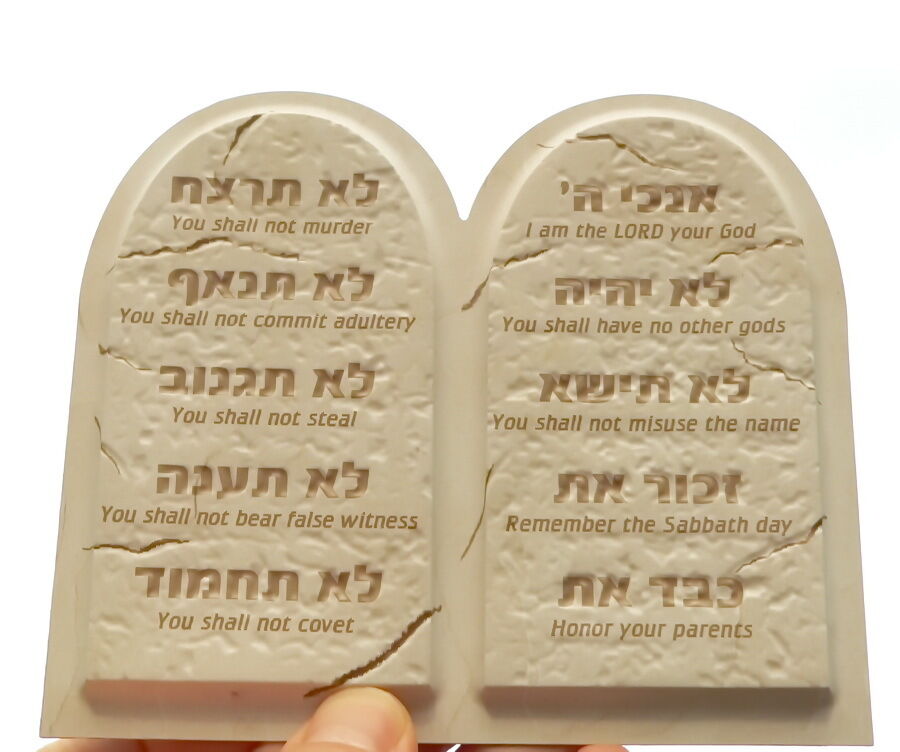
וַיֹּ֤אמֶר יְהוָה֙ אֶל־מֹשֶׁ֔ה פְּסָל־לְךָ֛ שְׁנֵֽי־לֻחֹ֥ת אֲבָנִ֖ים כָּרִאשֹׁנִ֑ים וְכָתַבְתִּי֙ עַל־הַלֻּחֹ֔ת אֶת־הַדְּבָרִ֔ים אֲשֶׁ֥ר הָי֛וּ עַל־הַלֻּחֹ֥ת הָרִאשֹׁנִ֖ים אֲשֶׁ֥ר שִׁבַּֽרְתָּ׃
The LORD said to Moses: “Carve two tablets of stone like the first, and I will inscribe upon the tablets the words that were on the first tablets, which you shattered”-Exodus 34:1
You shall make no molten gods. Passover shall you keep. The Sabbath you shall keep. Shavout you shall keep. You shall redeem your firstborn. You shall give the first of your produce to the Temple of G-d. Do not cook a kid in its mother’s milk. Write these words of my covenant. According to these words have I sealed a covenant with you and Israel.” And he was there with the LORD forty days and forty nights; he ate no bread and drank no water; and he wrote down on the tablets the terms of the covenant, the Ten Commandments- Exodus 34:17-28
Mosheh’ Greatest Achievement
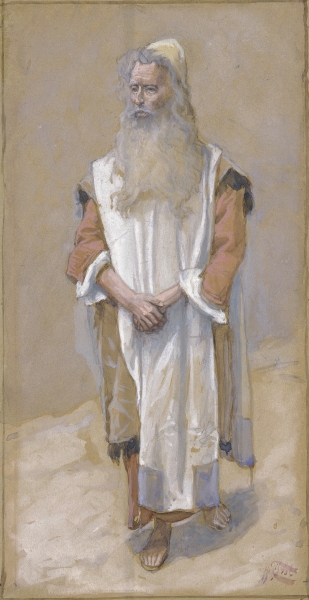
Which was Mosheh’ greatest achievement? Taking the Jews out of Egypt? Splitting the Red Sea? Receiving the Torah from G‑d and transmitting it to humanity? Or The breaking of the tablets?
וַֽיְהִ֗י כַּאֲשֶׁ֤ר קָרַב֙ אֶל־הַֽמַּחֲנֶ֔ה וַיַּ֥רְא אֶת־הָעֵ֖גֶל וּמְחֹלֹ֑ת וַיִּֽחַר־אַ֣ף מֹשֶׁ֗ה וַיַּשְׁלֵ֤ךְ מידו [מִיָּדָיו֙] אֶת־הַלֻּחֹ֔ת וַיְשַׁבֵּ֥ר אֹתָ֖ם תַּ֥חַת הָהָֽר׃ As soon as Moses came near the camp and saw the calf and the dancing, he became enraged; and he hurled the tablets from his hands and shattered them at the foot of the mountain. Exodus 32:19
The Talmud tells us that “everything goes by the ending. ”This would mean that by the mention of his breaking the tablets, the Torah is implying that this was his greatest virtue, greater than his being “the servant of G‑d” for 120 years; greater than his being the only human being with whom G‑d communicated face to face, greater than the “signs and wonders” he performed in Egypt, birthing a nation and leading them to freedom; greater than his possessing “the mighty hand” which received the Torah from G‑d; greater than his sustaining, protecting and governing 3,000,000 souls in “the great and fearsome desert” for forty years!
Furthermore, the words “which Mosheh did before the eyes of all Israel” (which Rashi understands as a reference to Mosheh’ breaking of the tablets) are not only the Torah’s last word on Mosheh, they also are the closing words of the Torah itself. This means that the Torah climaxes is interlaced with devastation! Fixing the world, Tikun Olam, what can you do to fix the world? Ask yourself and commit to help fixing a broken world, one good deed at a time. Kol Tuv.

The 8 Mitzvot in Parashat Ki Tissa
- Each man must give a half shekel annually Ex. 30:13
- A Kohen must wash his hands and feet before service Ex. 30:19
- To prepare the anointing oil Ex. 30:31
- Not to reproduce the anointing oil Ex. 30:32
- Not to anoint with anointing oil Ex. 30:32
- Not to reproduce the incense formula Ex. 30:37
- To rest the land during the seventh year by not doing any work which enhances growth Ex. 34:21
- Not to cook meat and milk together Ex. 34:26 The Kohanim must eat the sacrificial meat in the Temple Ex. 29:33
The 613 Mitzvot
In The Torah there are 613 commandments, mitzvot, also known as the Law of Moses (תרי״ג מצוות, taryag mitzvot). The 613 mitzvot are first recorded in the 3rd century CE, when Rabbi Simlai mentioned it in a sermon that is recorded in Talmud Makkot 23b.
The 613 commandments include 248 “positive commandments”, to perform an act (mitzvot aseh), and 365 “negative commandments”, to abstain from certain acts (mitzvot lo taaseh). The negative commandments number 365, which coincides with the number of days in the solar year, and the positive commandments number 248, a number ascribed to the number of bones and main organs in the human body.
Though the number 613 is mentioned in the Talmud, its real significance increased in later medieval rabbinic literature, including many works listing or arranged by the mitzvot. The most famous of these was an enumeration of the 613 commandments by Maimonides, The Rambam.
Many of the mitzvot cannot be observed now, following the destruction of the Second Temple, although they still retain religious significance. According to one standard reckoning, there are 77 positive and 194 negative commandments that can be observed today, of which there are 26 commands that apply only within the Land of Israel. Furthermore, there are some time-related commandments from which women are exempt (examples include shofar, sukkah, lulav, tzitzit and tefillin). Some depend on the special status of a person in Judaism (such as kohanim), while others apply only to men or only to women.
according to Rambam Organized by Parshah. based on Wikipedia and http://www.vaadrv.org/rambam613mitzvot.aspONE BIG IMPORTANT NOTE WHEN USING THIS LISTING: This listing is not all inclusive. Rambam may site multiple sources for a mitzvah is his works but this list currently only gives one source for each mitzvah.

Check out YedidYah Psalm 96 “Yiram Hayam” Music by Rabbi Yakira Yedidia https://youtu.be/aTBD4i9nvXw
The Priestly Blessing
יְבָרֶכְךָ יהוה, וְיִשְׁמְרֶךָ- May the LORD bless you and guard you
יָאֵר יהוה פָּנָיו אֵלֶיךָ, וִיחֻנֶּךָּ -May the LORD make His face shed light upon you and be gracious unto you
יִשָּׂא יהוה פָּנָיו אֵלֶיךָ, וְיָשֵׂם לְךָ שָׁלוֹם- May the LORD lift up His face unto you and give you peace
Check out YedidYah “The Priestly Blessing” Birkat Hakohanim. Music by Rabbi Yakira Yedidia https://youtu.be/YNE11QdEMN0
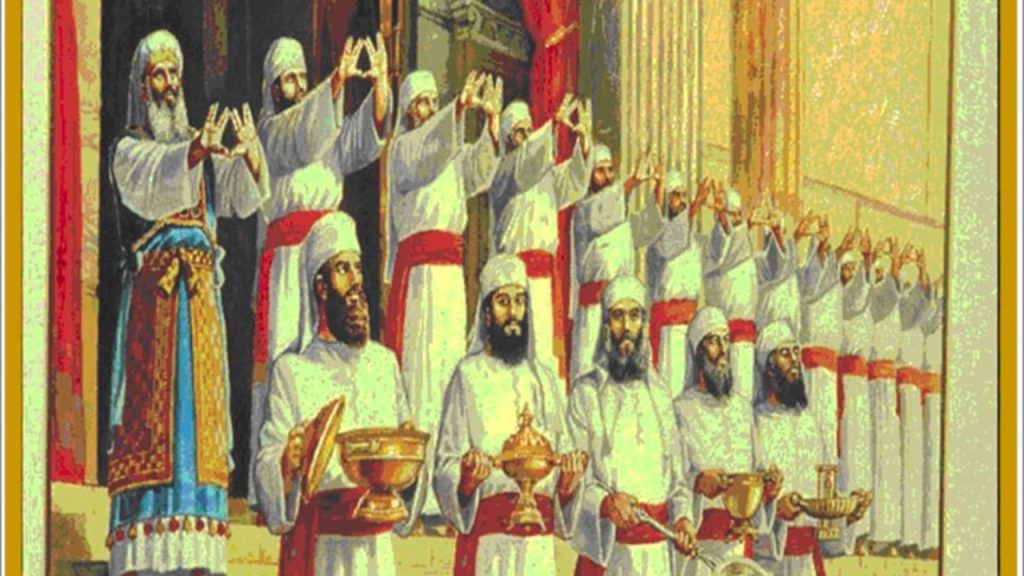
#####
This blog article was inspired by chabbad.org

